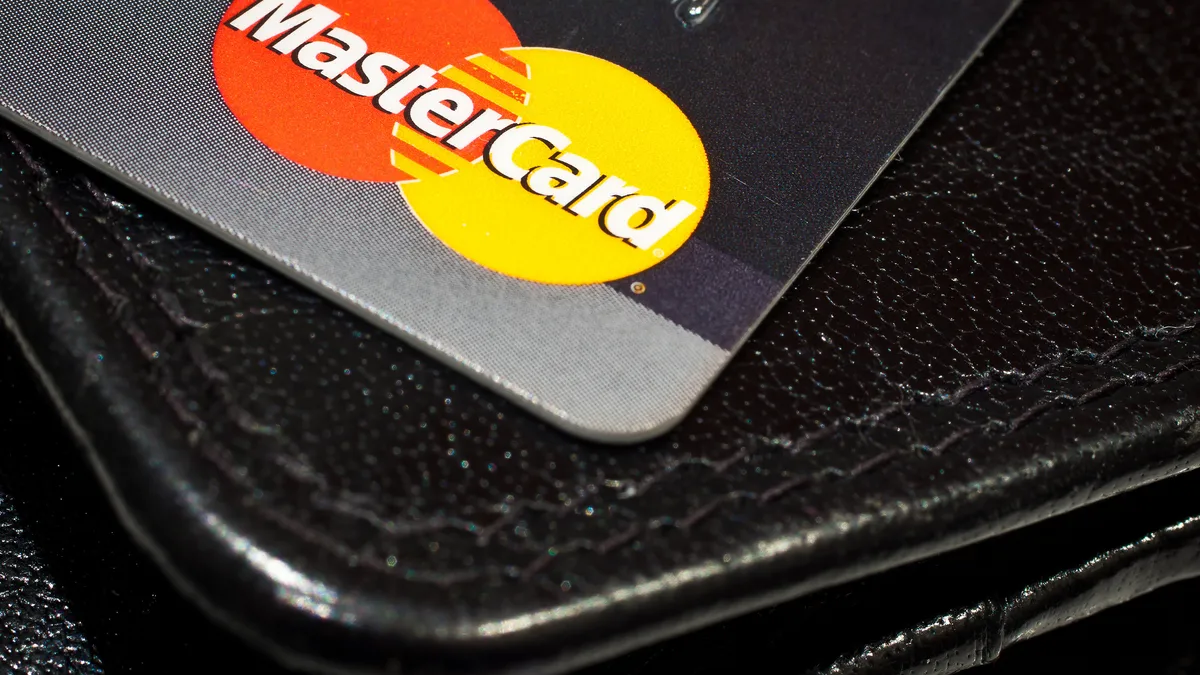UPDATE: Nov. 19, 2020: Mastercard completed its $825 million acquisition of data aggregator Finicity, the credit card company announced Thursday.
"Today is a great milestone as we continue to build out the solutions that deliver on the potential of open banking," Craig Vosburg, president of North America for Mastercard, said in a statement. "We now turn our focus on bringing these two talented teams together. That starts with our shared commitment to consumer-centric data practices to create more value for consumers and businesses from the information in their account and give them more control in how that data is used."
The acquisition, which the card network said Monday had been cleared by the Justice Department (DOJ), comes as the DOJ is suing to block rival Visa's planned purchase of data aggregator Plaid, claiming the deal represents an anti-competitive move on the part of the payment processor.
Each of the three largest payment networks has made or proposed an acquisition for reportedly more than $750 million this year. In addition to Mastercard's $825 million Finicity deal and the beleaguered $5.3 billion Visa-Plaid tie-up, American Express announced it would acquire Kabbage's team, its full suite of fintech products, its data platform and its internet protocol for small businesses for an undisclosed price that Barron's puts between $750 million and $1 billion.
Dive Brief:
-
Mastercard plans to purchase data aggregator Finicity for $825 million, the credit card giant announced Tuesday. The proposed deal allows Finicity shareholders to earn an additional $160 million if performance targets are met, Mastercard said.
-
Mastercard said the acquisition, which is expected to close by the end of the year, will strengthen its existing open banking platform and reinforce the company's partnerships with financial institutions and fintechs across the globe. "Open banking is a growing global trend and a strategically important space for us. With the addition of Finicity, we expect to not only advance our open banking strategy, but enhance how we support and accelerate today's digital economy across several markets," Mastercard President Michael Miebach said in a statement.
- The announcement echoes a move by credit card rival Visa, which revealed in January its plan to purchase data aggregator Plaid for $5.3 billion.
Dive Insight:
Following Visa's Plaid deal earlier this year, Mastercard shows that it, too, is looking to diversify while embracing open banking.
"This is a smart move by Mastercard in response to the Visa acquisition of Plaid," Sam Maule, managing partner for North America at fintech consultancy 11:FS, told Banking Dive. "Now that Plaid and Finicity have been acquired, that just leaves [data software company] MX in this space. Will be interesting to see what happens next."
Finicity shares Mastercard's commitment to consumer-centric data practices, "ensuring consumers have a say in how and where their information should be used," Miebach said.
"It's through the use of next generation open banking [application programming interfaces] and clear consumer approvals that this financial information can deliver streamlined loan and mortgage processes, rapid account-based payment initiation and personal financial management solutions," he said.
Given their acquisitions in the first half of 2020, the Visa and Mastercard "arms race" is likely to continue, said Bryce VanDiver, a partner at consultancy firm Capco.
"They both have doubled down on data and infrastructure plumbing as a hard requirement in the future of banking," he told Banking Dive. "Card networks successfully transformed their brand and core competencies around technology before the broader fintech wave hit.
"Now they are building off this strategic pivot to acquire technology assets with broad network reach that reinforces the digital acceleration of banking across all products, not just payments, that will give them immense scale and influence in setting the next generation of operational standards and regulation."
Data debate
The latest moves from Mastercard and Visa come as data aggregators have had somewhat testy relationships with banks in recent months. At issue is the use of customer data.
Data aggregators such as Plaid, Finicity and Yodlee are often referred to as the software "plumbing" that enables popular fintechs, including Venmo, Chime and TransferWise, to connect to customers' bank accounts.
But not all financial institutions are comfortable with their method of data collection: screen scraping.
The practice, where a third party requests credentials from a customer's account to glean information that is then provided to a fintech, has been called unsafe by some financial institutions, including JPMorgan Chase and PNC.
Both banks enacted security and policy changes in the past year that blocked some aggregators from accessing user passwords.
Fintechs have argued the practice of blocking third-party access limits customer choice.
"If every player is independently deciding which app is OK for their customers to use, they may override the decision the consumer has already made," John Pitts, policy lead at Plaid, said this year.
As banks tighten controls around third-party access, fintechs have made efforts to alleviate privacy concerns and boost the use of APIs.
Plaid recently launched Plaid Exchange, an API platform the startup said will help smaller financial institutions compete with the likes of Wall Street banks that have the financial wherewithal to develop in-house APIs.
And Finicity and Plaid are both members of the Financial Data Exchange, a nonprofit organization made up of banks and fintechs that aims to unify the financial sector around the secure exchange of financial data.
"Enabling people to access and control their data, while ensuring best practices to protect that data, will continue to drive tremendous innovation that increases financial literacy, inclusion and health," Steve Smith, CEO and co-founder of Finicity, said in a statement. "This partnership with Mastercard helps us accelerate this mission globally."













